If you’re the owner of a Great Dane or another giant breed dog, you may be wondering if neutering will get them to chill out. Does neutering calm a dog down? W
You’ll be surprised to learn that there are many other factors at play, and when it comes to neutering your Great Dane there is a lot to consider. We will dive into this today and give you some well-researched and much-needed advice!

Intact Dog Behavior
There are many behaviors exhibited by male dogs, and in some cases, it does not matter if they are intact or not. This will provide clues to whether or not neutering is right for your dog and if it might calm them down.
I’m going to outline each situation below!
Marking Territory
Many dogs mark their territory, including females! Entire male dogs tend to do this more frequently, but it is a behavior that can be seen in both sexes.
Males will also urine-mark when they are feeling anxious or stressed.
(Do you need help cleaning urine odor and marking stains out of your house? We recommend Skout’s Honor, it really works! I speak from personal experience. Buy on Amazon and have it in your hands super fast! Click here:)
This is their way of trying to feel more secure in their environment.
Neutering does not necessarily change this behavior, unfortunately, as for many dogs, it’s just part of their habits and routines.
If you are having problems with your dog marking territory indoors, there are products such as belly bands that, when paired with diligent supervision and training can help with this issue.
Here are some of our favorites:
- Skout’s Honor Enzyme Cleaner to eliminate urine marking stains
- Washable belly bands for male dogs
- Slip lead for tether training
- XXL crate to prevent marking when you cannot supervise
- Training treats to reward outside urination
Male Dog Humping
Humping is often seen as sexual behavior or dominance, but it’s actually more of an insecurity thing.
As a matter of fact, the relationship between “humping” and “dominance” is one of the most common myths in the world of dogs!
Dogs will hump other dogs, people, inanimate objects…anything and it’s not always related to sex, hormones, or dominance.
They do this to release stress, often caused by over-excitement, nervousness, or having a too-full bucket.
This means that your dog may be experiencing a form of anxiety brought on by over-stimulation, and humping provides a natural stress release. They learn pretty quickly that it feels good and helps them release tension, which makes this a self-rewarding behavior that is hard to eliminate.
Insecure dogs tend to exhibit this behavior most often. Puppies are no exception! They may be overwhelmed by the environment.
Depending on the cause, neutering your dog may reduce the frequency with which they hump, but for many dogs, it’s not a quick fix. Many pet owners are shocked when their neutered dog still humps.
The underlying cause of the behavior must be addressed first if you want your pet to stop humping. Unfortunately, sex drive and hormones have surprisingly little to do with humping.
Helping your dog build self-confidence will be much more effective at changing your dog’s emotional state than surgical castration.
That said, neutering does have benefits and should not be overlooked.
How do I Stop my Great Dane from Barking?
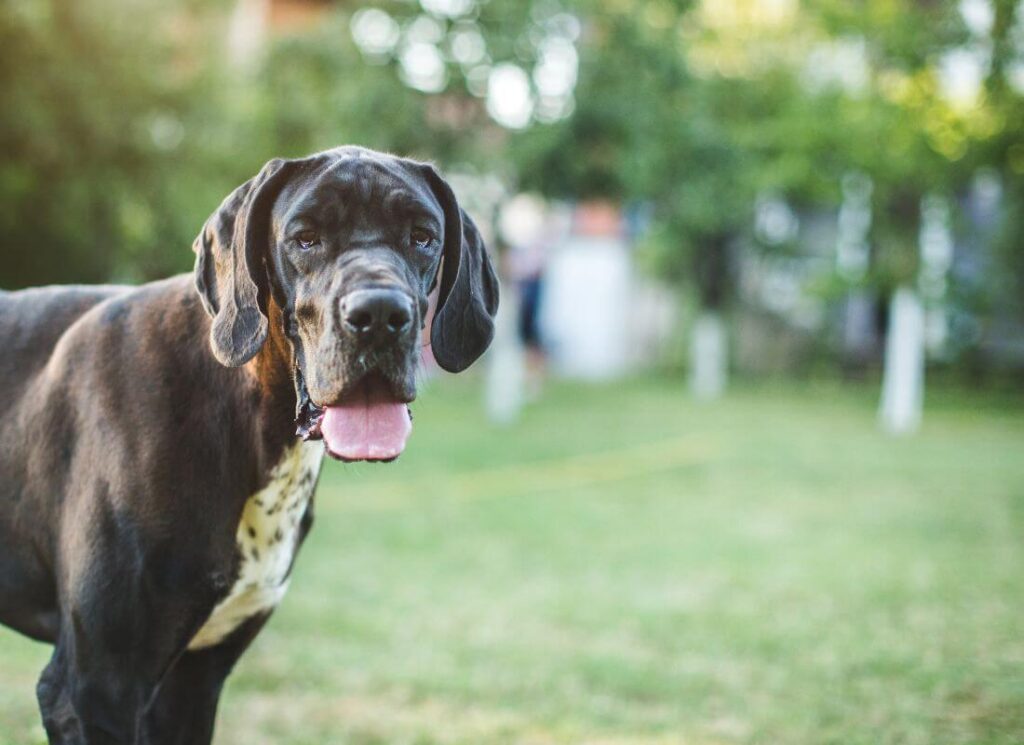
Aggression in Male Dogs
Hormones, including testosterone in male dogs, can absolutely lead to aggression and other undesirable or even dangerous behaviors.
As a matter of fact, same-sex aggression between male dogs, especially intact male dogs, is very common.
Many intact male dogs may be fantastic around dogs and people, but he can smell an intact male a mile away. Their hackles may immediately go up at the perceived threat. The hormones start flowing and they can definitely become protective, or defensive of their space.
Displaying dominant and rude behavior towards other intact male dogs is a common problem associated with delayed neutering! It doesn’t mean that the dog is aggressive, he’s really just hormonal and acting on basic biology.
This is one reason why many veterinarians and animal behaviorists will recommend neutering dogs that exhibit aggression of any kind. If you don’t have excellent obedience and control of your intact male dog, neutering your dog is the responsible thing to do.
A lot of times, the reduction in testosterone level following the procedure helps to settle their minds. Neutering is an important step in any behavioral treatment program, especially for dogs who encounter other male dogs often.
Fear Aggression
Many dogs, however, are experiencing fear-based aggression. Some information suggests that hormones can cause dogs to be more timid or fearful than they would be otherwise.
Here are some common examples of this behavior:
- Resource guarding (fear of losing something)
- Reactivity (fear of being hurt)
- Escalated fear-based aggressive reactions caused by triggers such as rude children, punitive training, or abuse
Reactivity is a common form of aggressive behavior that can easily be caused by preventable situations. Reactive dogs are often just having a hard time dealing with something in the environment.
For example, a dog may be reactive because they are on a leash and cannot properly greet dogs and people without feeling trapped. The added pressure on their restraint device (collar, harness, etc.) escalates their feelings of frustration, especially when they are around other dogs that may be showing defensive or aggressive body language.
Some dogs are reactive at the fence line for similar reasons.
That said, it’s important to realize that there are other factors at play when it comes to aggression in dogs. Neutering is not a magic bullet that will make all aggressive behaviors go away.
As a matter of fact, some studies have also shown that neutering may increase fearful and aggressive behavior in dogs with poor temperaments.
We recommend working with a highly qualified canine behaviourist to implement safe management and address your dog’s behavior if you are seeing aggressive tendencies.
Neutering your dog is only one thing to consider.
They will be able to evaluate what role hormones have played in the development of the behavior or aggressive tendencies and will be able to advise on the benefits or drawbacks of neutering.
Testosterone & fear
It’s also important to note that some people cite increased aggression after neutering their dog!
Emerging research indicates that dogs who are neutered prior to maturity (a very common practice) may actually exhibit unwanted aggression towards other dogs or people.
More research is needed, for sure. You should not be alarmed, however. While this type of behavioral change has been documented, it is unlikely that it will happen to your dog.
We do believe, however, that for health reasons related to orthopedic structure and bone growth, large and giant breed dogs should not be neutered until they are 18-24 months of age. (More on this topic below).
The benefits of waiting are currently being studied and the results look promising! Increased self-confidence and less risk of orthopedic disorders are just some of what researchers are learning.
As always, the underlying cause of a dog’s behavior should be of utmost importance; fearful and timid dogs are often that way because of genetics, and no surgical procedure is likely to fix that.

Male Dogs Chasing Female Dogs
Of course, the biggest problem with keeping an intact male dog in your house is mating!
Intact male dogs are often fixated on female dogs in heat. They will hound them relentlessly, trying to get to them in any way they can.
Their hormones will be raging; this behavior is natural biology at its finest. The humane society and other rescue organizations promote spay and neutering as a way to reduce and minimize the impact of accidental pregnancies.
Many rescue organizations offer low-cost spay and neutering programs to the community.
This mating behavior can also, unfortunately, result in broken fences, holes dug under the fence, and even physical injuries if your dog gets into a fight with another dog while he’s trying to mate.
This behavior can also be dangerous for the female dog if your male is not properly trained and supervised around her while mating.
Adolescent dogs who are immature and new to the business of making babies may be needlessly frantic and rough while mating and could hurt the female.
Many owners find it easiest (and safest) to just neuter their dogs to avoid all of these problems.
Not only that, but accidental pregnancies mean puppies. Puppies must be kept together as a litter for eight weeks; this can be time-consuming, exhausting, and expensive.
Pet owners have a responsibility to keep their intact female dogs safe from other male dogs, especially while they are in heat.
Those who own intact male dogs have an even bigger responsibility to ensure that their dog is well trained, not running off, under control, and if necessary, neutered to reduce these unwanted behaviors.
Intact male mating behaviors
If you have an intact male dog who is becoming frantic, you may have a female dog in heat nearby.
Here are some common behaviors that an intact male dog may exhibit when a female dog in heat is nearby:
- Drooling
- Panting
- Pacing
- Whining
- Barking
- Low appetite, including losing weight
- Acting ‘out of control’
- Jumping fences
- Breaking through walls and doors
- Escaping their crate
- Running away
Even the most well-trained dogs may lose their minds over an intact female!
(Some of these behaviors also indicate bloat, a deadly emergency! Know the difference. Click HERE for more information.
Living with intact dogs
If you have intact dogs in your home living together, these behaviors are often more pronounced.
Worst case, your dogs could tie and make puppies. It only takes a few seconds of unsupervised access for a tie to happen, and at that point, it will have been too late.
Dogs have been known to tie through fences and diapers, so don’t be complacent!
When a male and a female dog “tie”, they are connected and cannot be separated for a short time, often as long as 30 minutes.
The male’s penis swells inside the female, locking them together.
If this happens, do NOT try and separate them!
Leave them alone and call your veterinarian for advice.
In most cases of accidental mating, the puppies are not coming from exceptional, fully health-tested parents, and the most ethical and responsible thing to do is to seek veterinary advice as soon as possible.
A routine spay abort may be recommended to eliminate unwanted pregnancies, especially when the health of the female or the puppies is at stake.
The ONLY prevention from accidental puppies is several degrees of separation.
If you have a female in heat who is living in your home with an intact male dog, we highly recommend neutering the male or boarding him until her heat cycle is completely finished.
Accidental pregnancy is often complicated, not to mention unethical in the context of full animal shelters and when compared to truly thoughtful breeding.
Dogs that are neutered tend to be less fixated on females in heat and are less likely to engage in these types of behaviors.
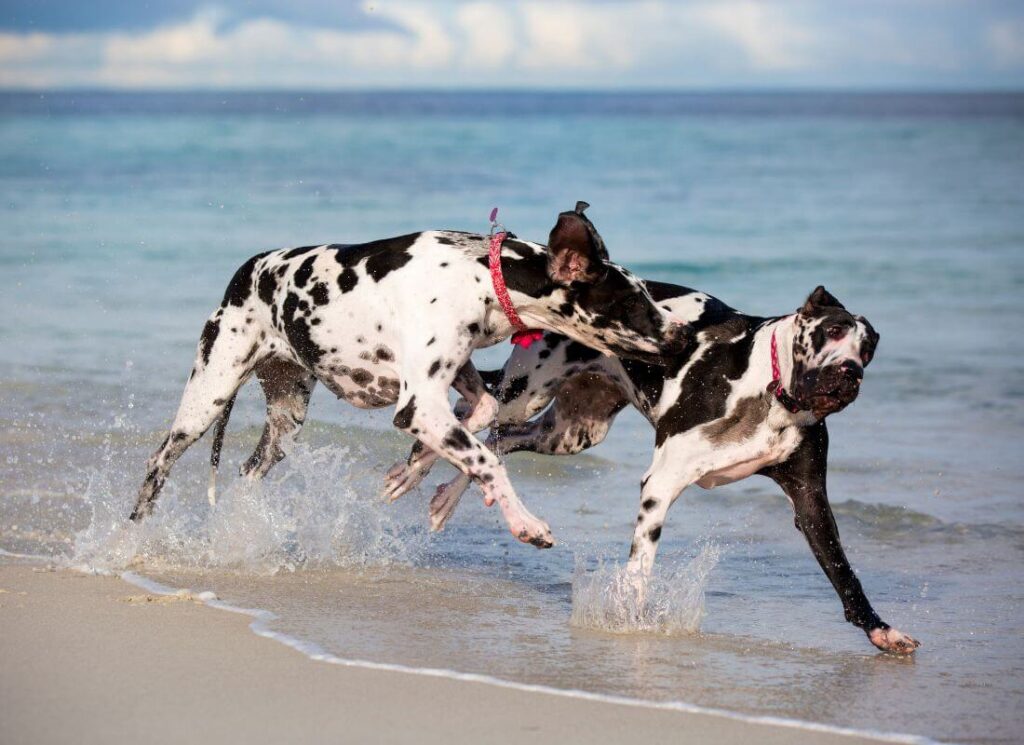
Does Neutering Calm a Dog Down?
In short, neutering can help with certain behaviors but it may not be a cure-all for everything.
It’s important that you understand the pros and cons of neutering before making a decision for your dog.
Neutering can have some health benefits, such as a reduction in the risk of testicular cancer, but it also has some risks.
These must be weighed against the behavior problems that neutering may help to solve, including the risks associated with an accidental pregnancy.
We often see Great Dane owners, desperate for relief from their bouncy, strong 8-month-old male who has suddenly become aggressive or started resource-guarding food.
You may notice a common theme here, though.
While testosterone levels can fuel these behaviors, the root cause often lies in genetics and training.
Depending on the individual dog, neutering may or may not help calm them down at all. Many times, a highly qualified canine behaviourist is needed.
How to calm a dog down
Here are some more effective ways to calm your crazy dog down, whether they are neutered or not!
- Daily positive training to reinforce the basics, including sit, down, stay, place, and come
- Trick training to work their mind
- Weekly intermediate and advanced training classes
- Obtain a Canine Good Citizen Title
- Feed all meals in puzzles or from your bait bag (aka treat pouch)
- Explore off-leash (safely, of course)
Many dogs with crazy behavior are actually just bored or not well trained! If you want to help your dog calm down, encourage calm behavior with positive reinforcement, daily training, and a lot more enrichment.
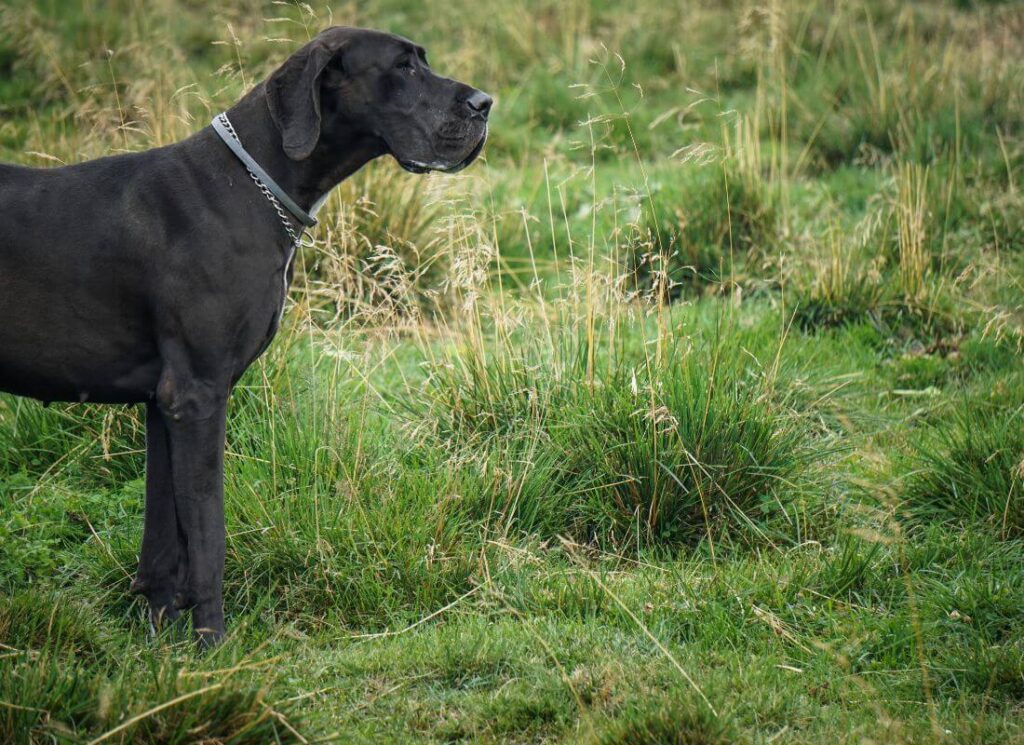
The Benefits of Neutering
One of the major benefits of neutering is that it completely eliminates the chance of accidental pregnancy.
Dogs that have been neutered are much less likely to be driven by hormones, and as a result, will not freak out or attempt to get to intact or newly spayed females.
Male dogs that are neutered tend to be less aggressive and more relaxed overall, especially when their behaviors have been fueled by a combination of genetics and testosterone.
Neutering can also help with certain types of behavior problems, including roaming, urine marking, and humping. However, as above, the root cause of a dog’s behaviour must be addressed first.
Health Risks in Neutered Dogs
Many studies are showing the benefits associated with keeping male dogs intact, especially if they are large or giant breed.
This is where the behaviour, hormones, neuter, and common myths discussions become even more complicated.
Neutered dogs have:
- Increased risk of osteosarcoma bone cancer (when neutered before 1 year of age)
- 1.6x higher risk of cardia hemangiosarcoma
- 3x risk of hypothyroidism
- Higher risk of geriatric cognitive impairment
- Quadruples the risk of prostate cancer
- Triples the risk of obesity
https://www.ncbi.nlm.nih.gov/pmc/articles/PMC4096726/
https://www.frontiersin.org/articles/10.3389/fvets.2020.00388/full
There are valid and researched reasons for responsible dog owners to keep well-tempered male dogs intact.
What is the Best Age to Neuter a Dog?
This one is actually a hot-topic debate.
Veterinarians will offer differing opinions and advice on this one, and sometimes it depends on the owner too!
Responsible owners can safely keep a well-bred and well-mannered dog intact through maturity or beyond.
Many owners, however, cannot.
You can take a quick walk around any municipal animal shelter and see the results of these failures.
For this reason, many veterinarians recommend neutering at or before 4-6 months. They will draw a hard line in the sand and may not even see pets who are still intact.
Other veterinarians will take a different approach and welcome responsible dog owners who wish to delay spaying and neutering.
Talk to your veterinarian. The important truth here is that NO veterinarian, even those who support delayed spay and neuter programs, will be supportive if you are not a dedicated and responsible dog owner.
Responsible dog owners:
- Train their dogs well
- Socialize their dogs well
- Keep their dogs in excellent condition (including teeth and nails)
- Don’t allow their dog to become overweight
- Seek regular veterinary care, including yearly well-visits
- Keep their dog’s vaccines up to date
- Use flea, tick, and heartworm prevention as advised
- Don’t breed dogs that aren’t fully health tested and proven as excellent examples of their breed
Research in neutering
Emerging research indicates that male dogs in particular should remain intact until maturity. For large and giant breed dogs, this can mean 18-24 months of age or later!
It is believed that keeping male dogs intact through puberty can help reduce the risk of:
- Hip dysplasia
- Arthritis
- ACL/CCL tears
- Poor overall substance
- Timid and fearful behavior
More research is definitely needed here, but there is a lot to be said for keeping testosterone levels intact while large and giant breed dogs are still maturing.
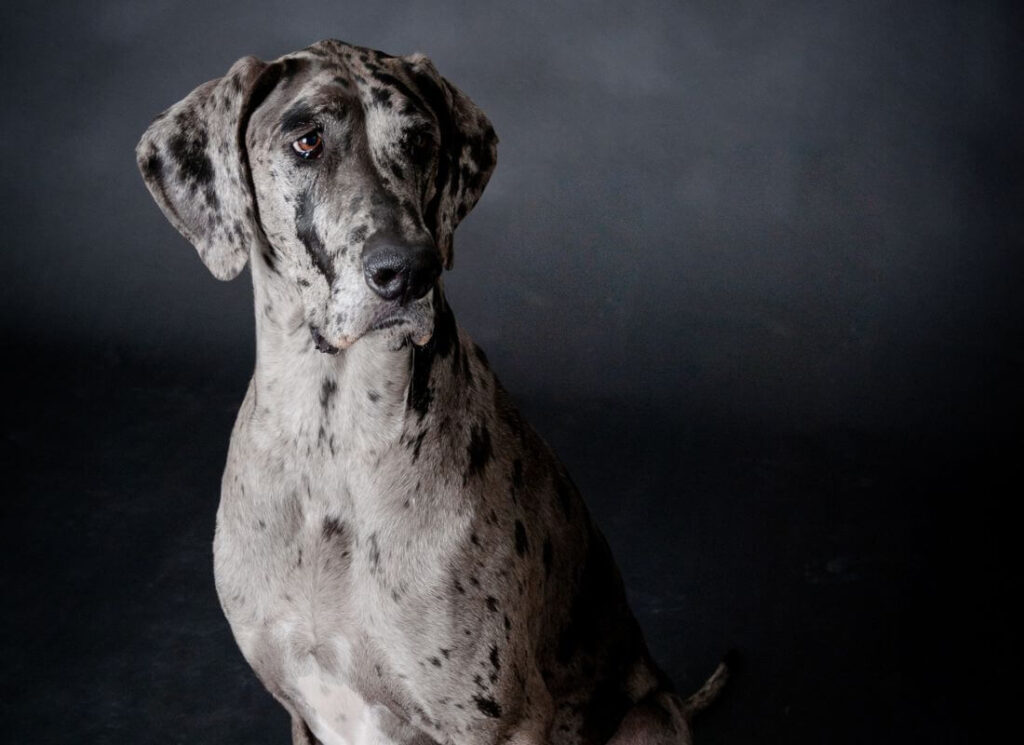
The Neutering Procedure
You may be curious about what to expect, so I’ve outlined some common Q&A about neutering your dog below!
Pre-Op Bloodwork and Wellness Check
Before scheduling your dog for a neutering procedure, your veterinarian should perform a physical exam and pre-op bloodwork.
This is to make sure your dog is healthy enough for anesthesia and surgery.
Dogs who have a heart murmur or heart disease, who are obese, or who have a genetic link to blood clotting disorders, DCM, wobblers, bloat, or other health problems will have an increased risk of complications during surgery.
Dogs that have been eating a grain-free, home-cooked, or boutique diet should also have an echocardiogram prior to surgery, as unbalanced nutrition can lead to deadly heart problems which can complicate surgery.
(Want to prevent this? Feed a veterinarian-recommended science-backed grain-inclusive diet).
What happens during neutering
Neutering is a quick and relatively simple procedure.
Your dog will be given a general anesthetic and often a local one as well.
The testicles are removed through a small incision in the scrotum. The sack will be left; it will eventually shrivel up, however, this process may take weeks or months.
The incision is then stitched closed. Neutering takes about 15-20 minutes and most dogs wake up quickly after surgery.
Scrotal ablation
Sometimes your veterinarian may recommend scrotal ablation, in addition to neutering.
This is a procedure where both the testicles and the sack are removed.
This is a much more invasive surgery, however, aesthetically it may be preferable if you have a large or giant breed dog who has reached or passed maturity.
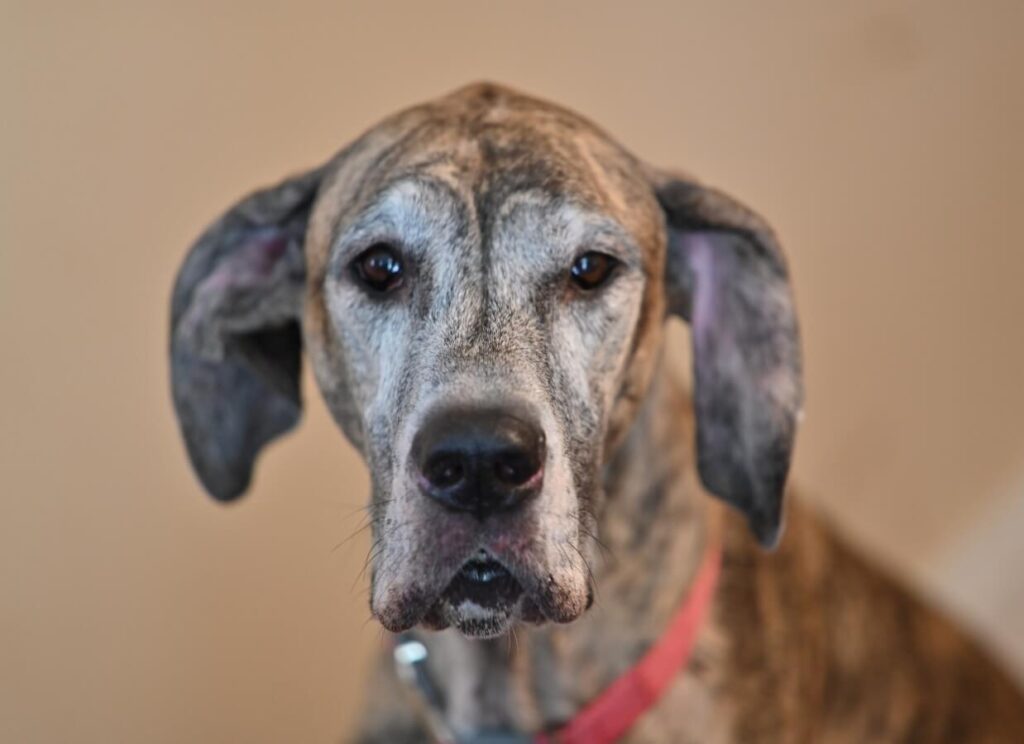
What to expect after neutering
Your veterinarian will send you home with pain medication and antibiotics. Your dog will likely be coming home the same day as the procedure and will be loopy, tired, and possibly disoriented.
The incision site should be checked daily for any signs of infection, swelling, or excessive redness.
Most dogs feel a little groggy after surgery but are back to their normal selves within a day or two.
Some may experience mild nausea and will not have much of an appetite. This is NORMAL and should not be cause for alarm unless it persists for more than a day or two.
If your dog is acting lethargic, has a fever, or is vomiting excessively, please call your veterinarian!
If proper pain medication has not been administered, your dog may also show signs of pain including whining, restlessness, and drooling.
If this is the case, please call your vet!
You should also keep your dog calm and quiet for at least two weeks after surgery to allow the incision to heal properly. This means no running, jumping, or playing off-leash.
You must find some way to keep them occupied so they don’t get bored! This can be a difficult task, but it is crucial to their recovery.
It is ideal to have a dog crate or small room where they can’t jump on furniture or play to roughly. We’ve linked some of our favorite post-neuter surgery puzzle toys below!!
If you have other animals or pets in the home, you may need to keep them separated for a few weeks as well.
Post-Neutering pain relief
CBD and other ‘holistic’ home remedies are NOT enough medication for humane surgical recovery.
It is important that your dog is truly pain-free.
We encourage you to follow your veterinarian’s advice for prescription pain relief and antibiotics, which have been proven safe and effective.
Common medications that are prescribed after neutering may include:
-Tramadol
-Gabapentin
-Rimadyl
-Metacam (Meloxicam)
Excess fluid following neutering
Large or giant breed dogs, especially those who are allowed to move and play too much following surgery may develop fluid that will build up in the newly emptied testicular sack.
This alarming and often painful condition can lead to infection and may require veterinary treatment. If you notice that the scrotum is becoming enlarged, red, or angry, please call your veterinarian!
Neutering healing time
Your dog should have absolutely no access to the surgical site, as licking can cause infections and delayed healing.
The incision should be fully healed within two weeks. Your veterinarian will advise you on when your dog can return to normal activity.
In general, small breed dogs recover quickly while large and giant breed dogs may take a little longer. In most cases, you can expect to resume normal activity within a month.
You should continue to monitor the incision site for any signs of infection or irritation. If you have any concerns, please call your veterinarian!
How to care for a dog after neutering
We highly recommend a surgical suit, which will be more comfortable for your dog and can help prevent them from licking the incision.
Other options include blow-up e-collars, which can be a little more cumbersome, or t-shirts (upside down so they can’t pull it over their head).
Whatever you choose, make sure your dog cannot get to the incision site!
Your dog may need to wear the surgical suit or cone for two weeks or until the sutures have dissolved and the skin is healed. Some dogs will require the use of both a surgical suit AND a cone!
If your dog is particularly insistent on licking the incision, talk do your veterinarian about sedatives.
Potential risks of neutering
All surgeries come with potential risks, which is why it’s so important to have a pre-surgical examination and echocardiogram prior to surgery.
The most common complications from neutering include:
– Bleeding
– Infection
– Swelling
– Pain
– Allergic reaction to the anesthesia or post-op pain medications
-Death from anesthesia-related complications
Fortunately, neutering is a very common procedure with a high success rate. A neutered animal is less likely to suffer from testicular cancer and much less likely to run away. The benefits of neutering should not be overlooked!
With proper care and monitoring, your pet dog will recover quickly and be back to its normal self in no time.
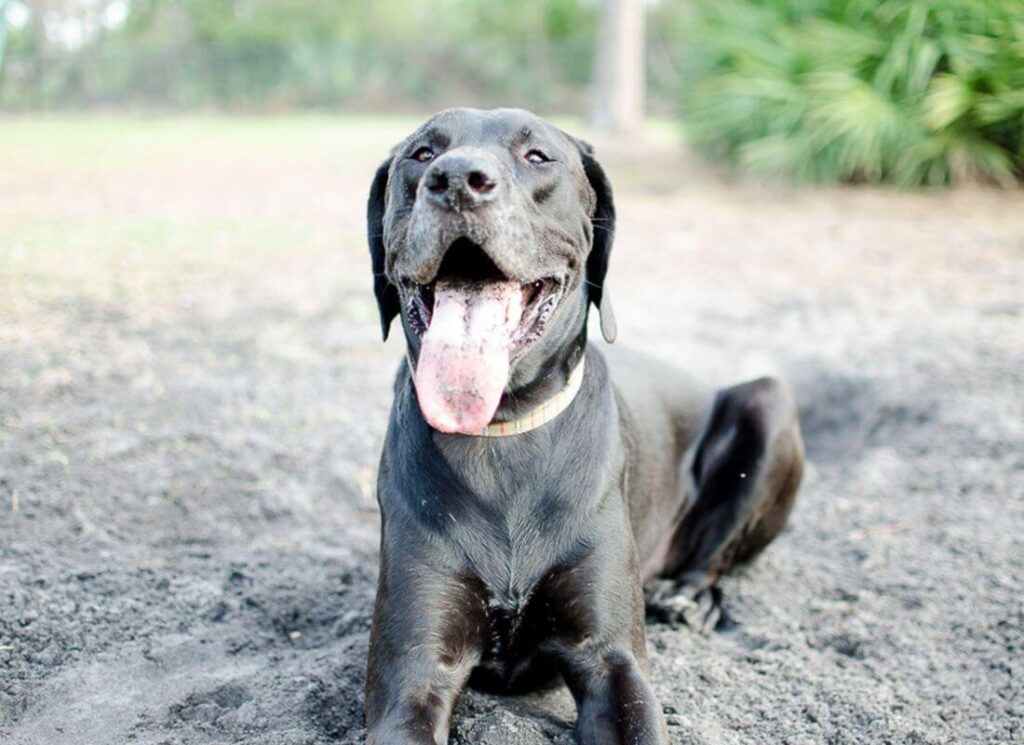
How much does Neutering Cost?
The cost of spaying and neutering will vary depending on your veterinarian, the size of your dog, and where you live.
In general, small dogs will cost between $200-$400 while large dogs will cost between $400-$600. Giant breed dogs may cost upwards of $1000. This may or may not include additional expenses such as a surgical suit, pre-op blood work, echocardiogram, or pain medications and antibiotics.
We understand that the cost of neutering may be prohibitive, so there are resources out there for people who cannot afford these costs.
You can check with your local humane society, SPCA, or animal rescue organizations to see if they offer any low-cost spay and neuter options.
Spaying or neutering is one of the most important steps any of us can take towards combatting the world’s huge problem with unwanted, poorly bred pets clogging the rescue system.
Not only does spaying and neutering help reduce the number of unwanted animals, it has health benefits for your pet!
READ MORE:

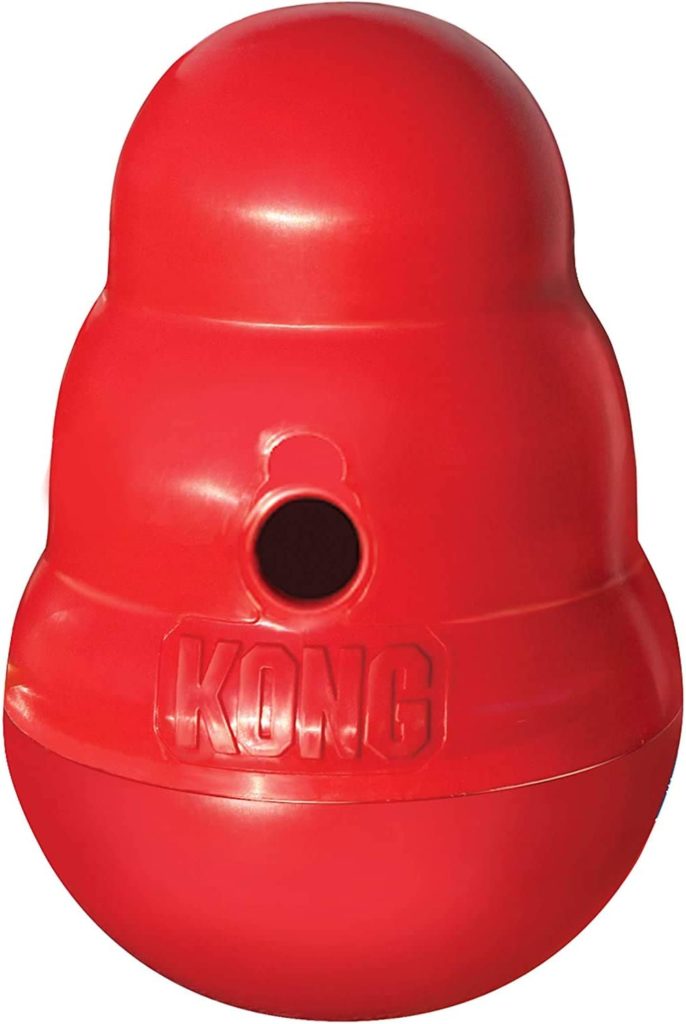
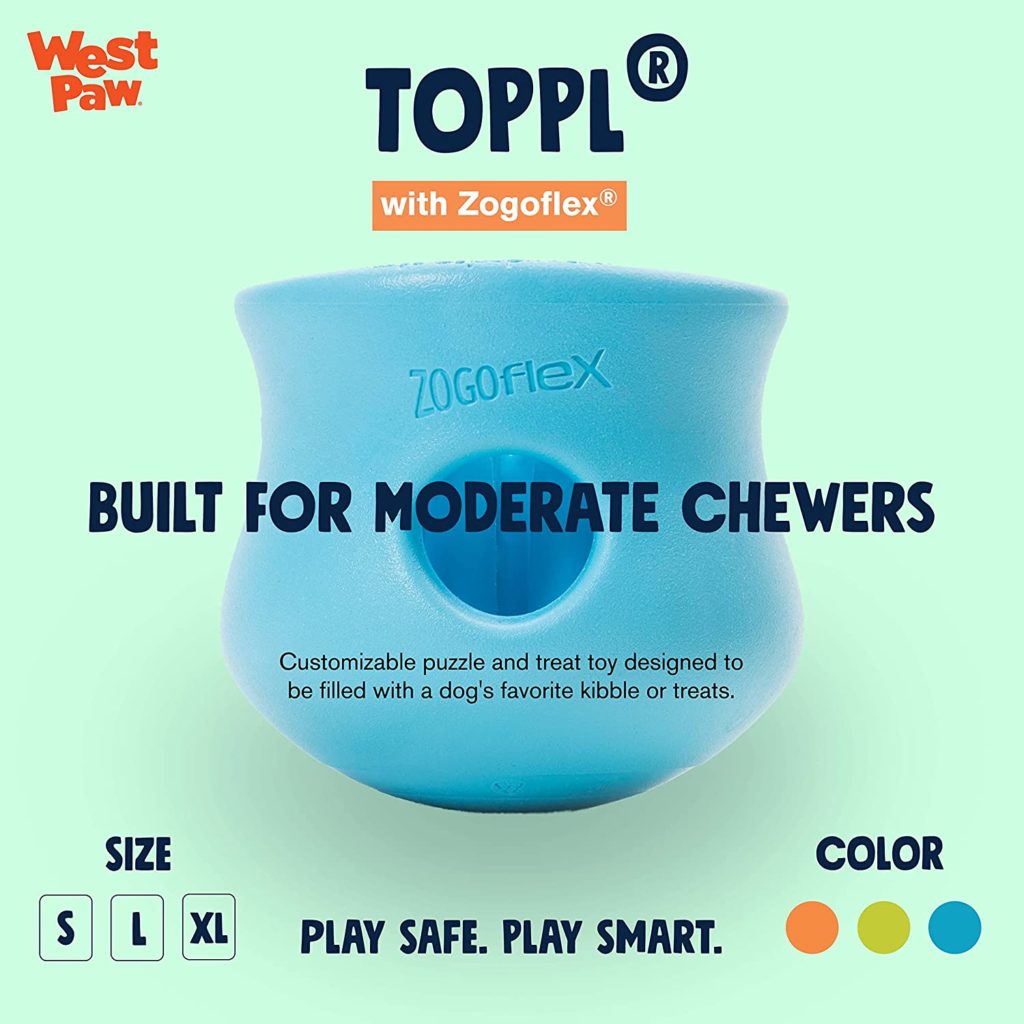


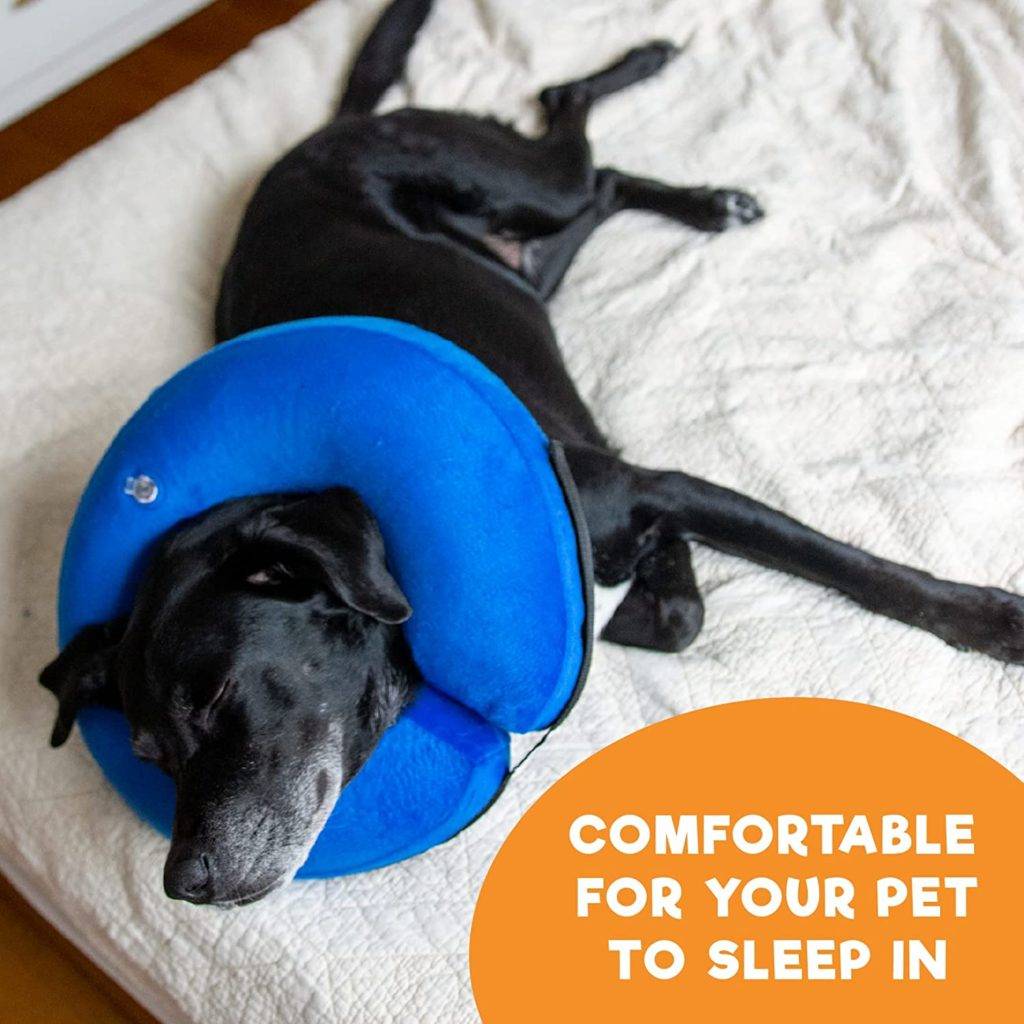
Leave a Reply